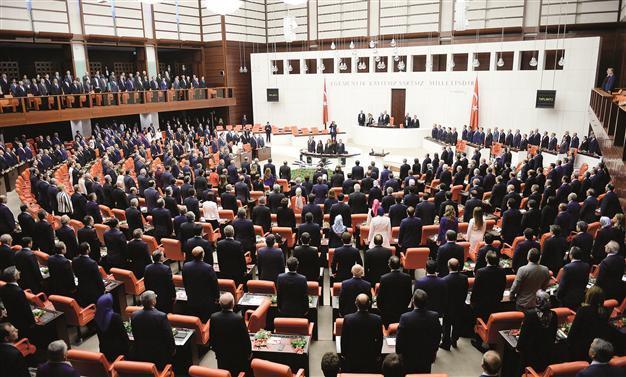Parties mull tactics to get Turkish parliament speaker’s seat
Nuray Babacan - ANKARA

HÜRRİYET photo
The two parties which received the most votes in the June 7 parliamentary election among the four political parties that made their way to the national assembly have been mulling how to get their candidate elected as parliament speaker in case of an eventual disagreement on the formation of a coalition government.In past coalition governments, the prime ministry post was allocated to the major partner in the coalition, while the parliament speaker was elected from among deputies of the minor partner. However, Turkish President Recep Tayyip Erdoğan still hasn’t given the mandate to form the government to the Justice and Development (AKP), which lost its parliamentary majority but still holds the highest number of deputies. This situation has complicated the process of nominating and electing the next parliamentary speaker.
Because of such ambiguity, and with Erdoğan having already made clear he would give the mandate only after the speaker is elected, the election of the speaker is expected to be completed in the fourth round, giving the parties more time to bargain on a coalition government. This could also grant them an opportunity to build a bloc behind the candidate they favor.
More and more executives and deputies from the AKP have been speaking up in favor of getting their candidate elected in the fourth round.
The AKP has argued, “Whether a coalition will be formed, and, even if it is formed, the AKP’s partner in this coalition is not exactly clear. Thus the AKP should not offer the parliament speaker’s seat as a gift to the opposition.”
Nonetheless, in such a case, the Republican People’s Party (CHP), the party with the second-highest number of deputies, has a chance to put forth a candidate who would be embraced by the so-called “60 percent bloc” and get an opposition candidate elected in the fourth round.
The phrase “60 percent bloc” was coined by CHP leader Kemal Kılıçdaroğlu, who pointed to the total percent of votes garnered by his party combined with those of the Nationalist Movement Party (MHP) and the Peoples’ Democratic Party (HDP) in the June 7 election. The AKP received around 41percent of the total, but failed to secure a majority in the 550-seat parliament required to rule alone.
Those who want to run for the number two position of the Turkish state have until midnight on June 27 to apply. The election process expected to be completed in four rounds will kick off then. If bargaining to be held in between those rounds does not eventually pave the way for a two or three party cooperation against the nominee supported by the AKP, then the latter will be able to get its favorite nominee elected as the new speaker by virtue of securing the most votes.
















